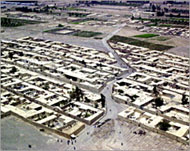Pakistan’s wild frontier
Pakistan’s tribal areas on the border with Afghanistan have long been a natural haven for those seeking to escape the attentions of the state.

The region is largely autonomous and the ethnic Pashtun tribes who inhabit it resent outsiders.
Al-Qaida leaders Usama bin Ladin and his number two, Ayman al-Zawahri, may be based in the region where Pakistani troops have been battling al-Qaida forces in South Waziristan since Tuesday.
Here are some key facts about the tribal areas:
– Known as the Federally Administered Tribal Areas (FATA), they cover about 27,220 square km of mountainous territory and are home to about six million people, mostly Pashtun tribesmen.
– Neighbouring areas are Afghanistan to the west, Pakistan’s North West Frontier Province to the north, Punjab to the east and Baluchistan to the south.
– The seven agencies that make up the FATA – Khyber, Kurram, Orakzai, Mohmand, Bajaur, North Waziristan and South Waziristan – have historical, cultural and ethnic ties to Afghanistan. Many of the residents sympathise with the former Taliban rulers of Afghanistan, their fellow Pashtuns.
– The official demarcation between Pakistan and Afghanistan is the 2240km border known as the Durand Line, drawn by British administrator Sir Mortimer Durand in 1893. On both sides of the Durand line are 26 tribal agencies that have their own laws and independent jirga (council) systems, with very little writ of the state.
 |
|
Azam Warsak, a village in South |
– Pakistani troops rarely enter the area, but since the 2001 US-led war on the Taliban their forays into the tribal areas have become more frequent.
– The area is awash in weapons. Pashtuns are renowned for ferocity and a feudal code called Pashtunwali that includes hospitality, revenge and honour. Any guest who asks for sanctuary will be protected. Women who marry outside the tribe may be murdered and feuds between families last for generations.
– Few of Pakistan’s federal laws apply in its tribal areas. To settle differences, the jirga weighs all evidence, accusations and the defence, and takes a collective decision. Outside interference is deeply resented.
– Tribal elders, known as Maliks, were given special favours by the British in return for services such as maintaining peace, keeping important roads – such as the Khyber Pass – open, and apprehending anti-state and anti-social elements. By and large, Pakistan continues this tradition.
– Low literacy ratios, scarce development funds, the fallout of the instability in neighbouring Afghanistan and rigid traditions have held back the tribal areas in terms of socio-economic development compared to the rest of Pakistan.